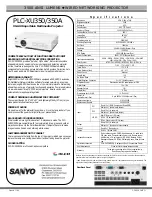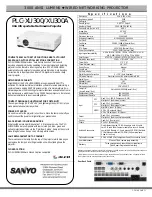
cians often use emphasis in the intensity of
notes to build rhythmic structures within the
measures of the music – it’s one of the things
that separates artists from technicians. Bass
that won’t get out of the way (and other
distortions) mars the fine artistic emphasis applied by
the musician, denying us access to the performance’s
inner architecture.
Finally, the presence of deep bass, accurately reproduced,
informs our perception of the music’s physical presence. It not
only adds weight, but it defines the environment of the per-
formance. Orchestral music, for example, is performed in
large venues that have observable modal characteristics only
at very low frequencies. These low modes allow us to hear the
size and volume of the space. It is an essential part of trying to
generate a realistic illusion of a live performance.
The $2,500 Revel Ultima Sub-15 is a stupendous sub-
woofer, when it is well integrated with your main speakers.
Each Sub-15 features a robust 15-inch driver in a compact cab-
inet that blends into your room easily. It offers very low dis-
tortion, with no audible doubling. If it is barnstorming in the
basement, it does so cleanly. Ultimately, I could play “The
Vikings” from
Pomp and Pipes
[Reference Recordings
RR–58CD] at lifelike volumes (94 dB peaks) without a hint of
strain in the Sub-15s. And the Sub-15 is clean enough to blend
seamlessly with the Salons, which means it should blend just
as well with any other speaker you choose, unless their char-
acters are radically different.
Driving the Sub-15 was Revel’s $6,000 LE-1 amplifier/
crossover. Used with one Sub-15, the LE-1 will pump out 700
watts; with two Sub-15s the LE-1 will deliver 1,200 watts total.
I used two LE-1s with the four Sub-15s. But I didn’t use their
internal analog crossovers, having previously played with the
crossover and having not cared much for its effect on the high-
pass signal. Instead, I relied on the digital crossovers in the
Proceed AVP and Theta Casanova controllers. While I was
playing with subwoofer placement, the LE-1’s phase adjust-
ment feature was invaluable. The blend with the Salons was
more transparent when the phase was adjusted
just so
and the
perception of the music’s timing improved. Both phase and
level can be adjusted by remote control from the comfort of
your chair.
Diagram 3: Tom Miiller’s All-Media Room
















































